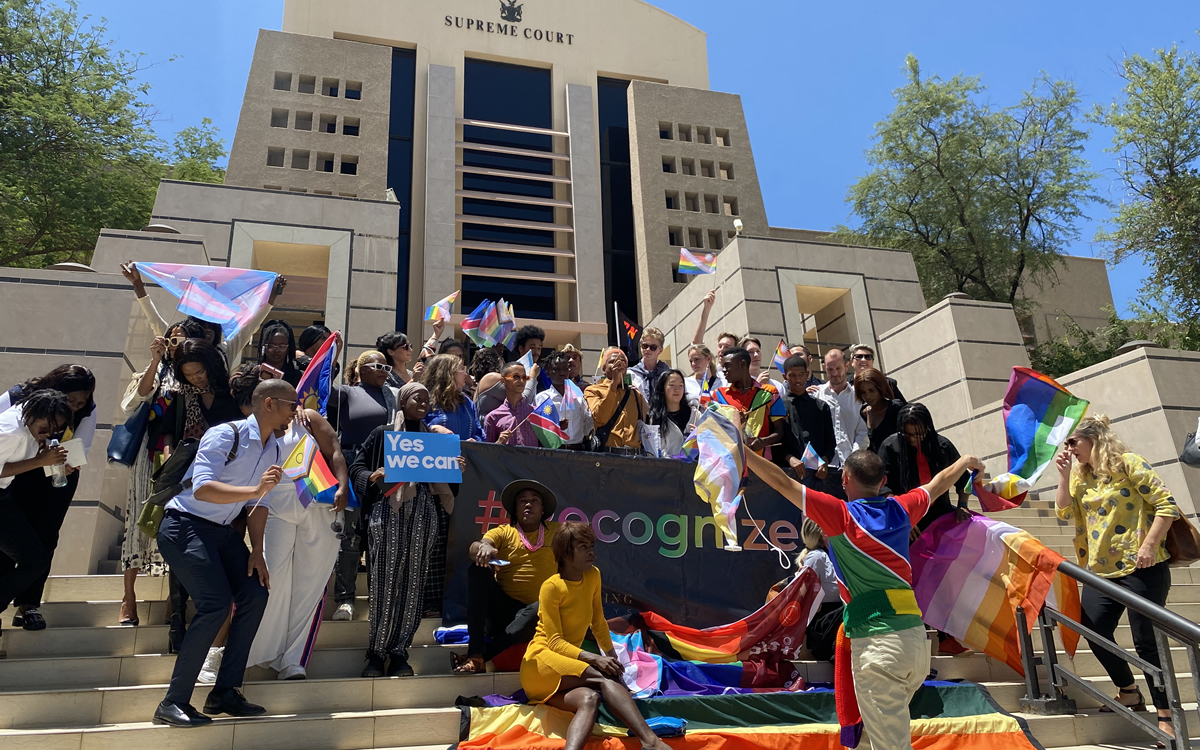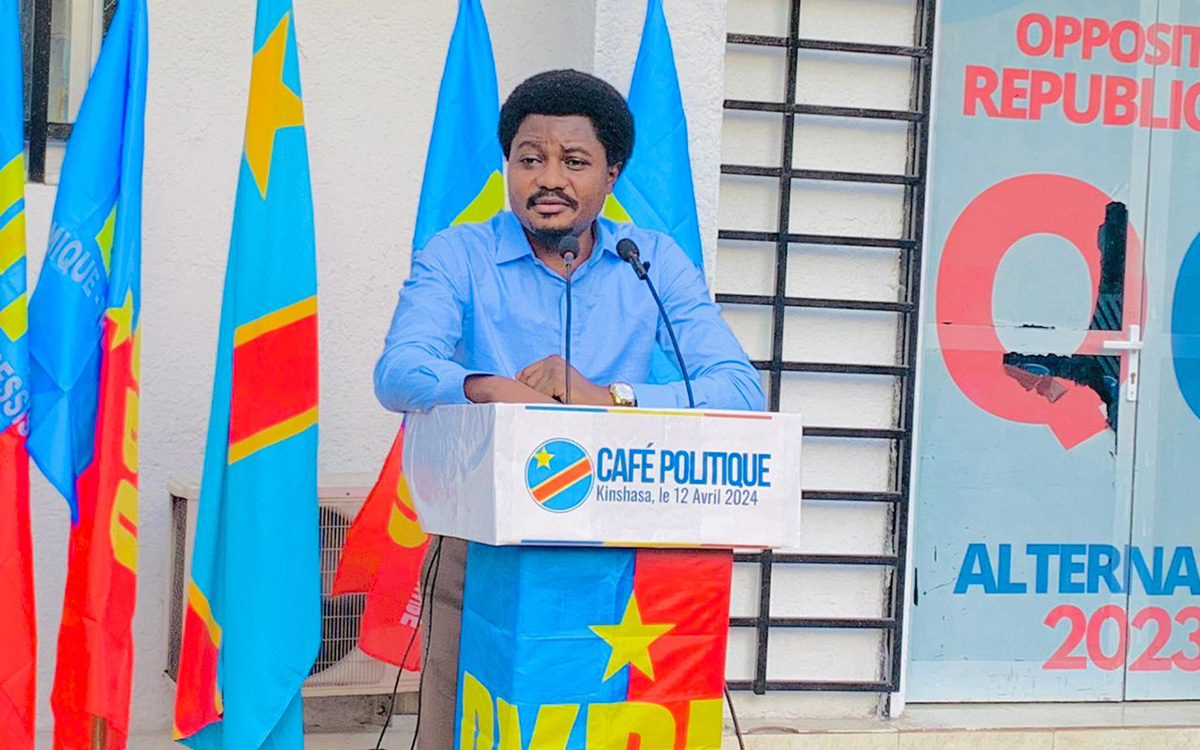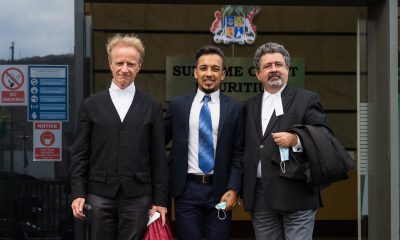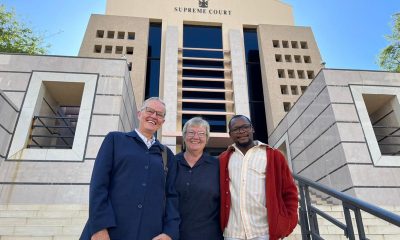Africa
Namibian Supreme Court hears three LGBTQ rights cases
Consensual same-sex sexual relations remain criminalized

The Supreme Court of Namibia will soon issue rulings in three pivotal cases involving LGBTQ and intersex people that will set a precedent for the recognition of same-sex marriages and spousal immigration rights for non-Namibian partners.
Furthermore, a case is soon to be heard in the country’s high court that will challenge the southern African nation’s antiquated sodomy law.
These cases have incited public debate around LGBTQ and intersex rights in a country where homosexuality is a controversial and polarizing subject.
This is the first time since 2001 that Namibia’s highest court will hear cases regarding same-sex relationships. It is also the first time the high court will hear arguments regarding the sodomy law.
The first hearing, which took place on March 3, was the joint cases of Digashu and Seiler-Lilles versus the government.
The applicants — both foreign nationals married to Namibian citizens — in both cases are seeking recognition of their marriages concluded outside Namibia in order to access spousal immigration rights such as permanent residence and employment authorization.
The second hearing, which took place on March 6, was in the case of a Namibian man married to a Mexican man seeking citizenship by descent for their children born via surrogate. The government has demanded DNA testing to prove that the Namibian national is the biological father to the children.
In the last case, a gay Namibian man is not only challenging the constitutionality of the country’s sodomy law but also the prohibition of “unnatural sexual offenses.”
While the cases represent a crucial moment for the country’s LGBTQ and intersex community and their rights, individual people and families fighting a fight bigger than they had foreseen are at the center of these cases.
Marriage, immigration and the law
South African citizen Daniel Digashu married Namibian national Johann Potgieter in South Africa in 2015. The couple and their son moved to Namibia in 2017.
While the move was favorable for the family, the law around same-sex marriage was not.
Digashu’s first encounter with the Home Affairs and Immigration Ministry was not to have them officially recognize his marriage. He was applying for a permit allowing him to work in the country in the company that he jointly started with his husband.
“We’ve always had a dream to live on a farm and run this tourism company. We registered the company first, about six months before we officially moved,” Digashu said.
He said the ministry advised him against applying for permanent residency because the country does not recognize his marriage. Officials instead told him to seek a work permit.
Despite assurances from the ministry’s personnel, the application was denied. Digashu filed an appeal, and that was denied too.
From this moment to today, Digashu has lived a life in limbo.
Due to the ongoing court cases, he is able to renew his visitor’s visa every few months. This, he said, comes with exhausting administrative costs that legal fees exacerbate.
Digashu said the process has put psychological, emotional and financial strain on his family.
“Prior to finding funding it had been quite difficult financially. It is not something that a lot of people would afford. I don’t think we even could afford it. That’s why we sought out and looked for funding and luckily we found that,” he said.
As they await the judgment of their hearing, everything remains the same for Digashu and his family: His husband remains the sole breadwinner as Digashu himself still cannot work.
Namibian citizen Anette Seiler and her German wife Anita Seiler-Lilles face the same dilemma.
Neither expected to become cornerstones of the advocacy around marriage equality and LGBTQ and intersex rights in Namibia.
“We didn’t plan to come to Namibia in the early 2000s,” said Seiler. “We thought we might want to come back when Anita didn’t have to work anymore, and that would be many years later. So, we didn’t think so much in terms of gay rights in Namibia at that time.”
“It was a very personal thing for us to get married. We were not active in Namibia or Germany in the gay community,” she added.
Both couples have received copious amounts of support from the local LGBTQ and intersex community and civil society as they fight to be afforded the same spousal rights that would be granted to opposite-sex couples.
Citizenship by descent and the right to family
As Namibia grapples with the recognition of same-sex marriages, the right to family and protections of them is another matter that has come under scrutiny.
Namibian citizen Phillip Lühl and his husband, Mexican national Guillermo Delgado, are fighting for their children born via surrogacy to be granted Namibian citizenship by descent.
Delgado and Lühl say they are fighting for their children’s birthright.
While both fathers are listed on the children’s South African birth certificates, the Namibian government has demanded DNA proof that Lühl is the biological parent of the children.
“The fact is that any other South African birth certificate is accepted but in our case it’s not because we’re of the same sex. In the case of a heterosexual couple, nobody will ever ask for any proof or dispute the validity of the document, but in our case it is,” Lühl said.
The children have been granted Mexican citizenship by descent after a rigorous process that ended with the country’s Foreign Affairs Ministry granting it.
“They initially were not favorable but concluded that Mexico would recognize a process that was duly and procedurally done in a constituency that they recognize, namely South Africa,” Delgado explained.
The family nevertheless plans to stay in Namibia and continue to fight the government for their children’s birthright and the recognition of their family.
Their case scrutinizes the ambit of the Namibian Constitution, which affords all its citizens protection against discrimination and the right to family.
‘Apartheid-era’ sodomy law
In the final case, Namibian gay activist Friedel Dausab has filed a constitutional challenge against the common law crime of sodomy and the prohibition of “unnatural” sexual acts.
Dausab brought a case against the government in June 2020 stating that the law promotes stigma and exclusion, and instigates the criminalization of consensual same-sex sexual acts between men.
Dausab argues that the offenses under the law are incompatible with the constitutional rights to equality, dignity, privacy, freedom of association and freedom of expression. He also argues that the crime of “unnatural sexual offenses” is too vague to be compatible with the constitution.
“I am challenging these laws as a lifelong and dedicated activist because I am acutely aware that criminalization is a clear obstacle to living a full, open, honest and healthy life,” he said.
Namibian Attorney General Festus Mbandeka in a recent affidavit he submitted to the high court said same-sex sexual conduct is immoral and unacceptable to many Namibians. Mbandeka further denied the existence of the sodomy law stigmatizes gay men.
“If these men suffer any stigma it is in consequence of their choice to engage in sexual conduct considered to be morally taboo in our society,” Mbandeka said.
While it is reported that 64 sodomy-related arrests were made between 2003-2019, the offenses are rarely enforced. The country’s Criminal Procedure Act 51 of 1977 nevertheless lists “sodomy” as a Schedule 1 offense.
The U.K.-based organization Human Dignity Trust says this listing means that either a police officer or an ordinary citizen can arrest anyone who is reasonably suspected of having committed the offense without needing a warrant. It is legal to use lethal force to kill them if the suspect attempts to evade arrest.
Namibia remains one of the few countries in southern Africa that is yet to abolish its sodomy law. Angola, Botswana, Lesotho, Mozambique and South Africa have already done so.
Africa
Ugandan activists appeal ruling that upheld Anti-Homosexuality Act
Country’s Constitutional Court refused to ‘nullify’ law

Twenty-two LGBTQ activists in Uganda have appealed this month’s ruling that upheld the country’s Anti-Homosexuality Act.
The Constitutional Court on April 3 refused to “nullify the Anti-Homosexuality Act in its totality.”
President Yoweri Museveni last May signed the law, which contains a death penalty provision for “aggravated homosexuality.”
The U.S. subsequently imposed visa restrictions on Ugandan officials and removed the country from a program that allows sub-Saharan African countries to trade duty-free with the U.S. The World Bank Group also announced the suspension of new loans to Uganda.
Media reports indicate Sexual Minorities Uganda Executive Director Frank Mugisha and Jacqueline Kasha Nabagesara are among the activists who filed the appeal.
Africa
Congolese lawmaker introduces anti-homosexuality bill
Constant Mutamba’s measure seen as distraction from country’s problems

A member of the Democratic Republic of Congo’s National Assembly who is a leader of the country’s opposition party has introduced a bill that would criminalize LGBTQ people.
Part of the bill that Constant Mutamba, leader of the Dynamic Progressive Revolutionary Opposition platform, has put forth states anyone who “commits a homosexual act (including acts and gestures) will be liable to a 5- or 10-year prison sentence.”
The country in recent years has seen government leaders and civic society target the community with anti-LGBTQ sentiments.
The Superior Council for Audiovisual and Communication, Media Regulatory Authority last June cautioned the media against showing LGBTQ-specific conversations. Several activists have criticized Mutamba’s bill, saying it seeks to move attention away from governance, service delivery and other pertinent issues in the country.
Sirius Tekasala, a human rights activist, said a person’s sexual orientation does not impact issues of governance.
“The proposed bill does not go in the direction of improving the socio-economic life of the Congolese people,” said Tekasala. “It’s not homosexuals who prevent you from doing your job well or from breathing. This is a violation of human rights.”
Mbuela Mbadu Dieudonné, a social analyst and trade unionist, said the bill is just a way of deviating people from the pertinent issues.
“He should suggest how to get the Congolese people out of this precariousness of life which is growing on a daily basis,” said Dieudonné. “When we don’t know the real problems of the Congolese people, he sets himself up as the great director of scenes to distract the Congolese people.”
Many Congolese, however, seem to support the bill and have applauded Mutamba for drafting it.
This is not the first time that such kind of a bill has been drafted.
An anti-homosexuality bill introduced in 2010 would have sentenced people who engage in consensual same-sex sexual relations to between three and five years in prison. The measure, however, did not become law.
Mutamba’s bill, however, may pass with Uganda’s Anti-Homosexuality Act in effect. The country’s Constitutional Court earlier this month upheld it. Burundi, Tanzania and other neighboring countries are also considering similar measures.
Many Congolese people view LGBTQ rights as a Western phenomenon that disregards their religious and cultural beliefs. LGBTQ Congolese are among those who have fled the country and sought refuge in the Kakuma refugee camp in Kenya and other places.
Consensual same-sex sexual relations are not criminalized in the Democratic Republic of Congo, but Congolese law does not recognize same-sex marriages.
Africa
Prominent transgender woman in Nigeria arrested, charged with defacing currency
Authorities say Idris Okuneye, known as Bobrisky, flaunted money

Nigeria’s Economic and Financial Crimes Commission’s decision to arrest a well-known transgender woman over the practice of flaunting money has sparked questions among several human rights activists.
Idris Okuneye, who is known as Bobrisky, was first arrested last Wednesday.
Justice Abimbola Awogboro of the Lagos Federal High Court on April 5 charged her with four counts of mutilating N490,000 (roughly $375.)
The EFCC alleges Bobrinsky between last July and August flaunted N50,000 (roughly $36) during a social event and N400,000 ($306) at another gathering last month. Bobrinsky has been charged with violating section 21(1) of the Central Bank Act of 2007.
“The Lagos Zonal EFCC, on Friday, April 5, 2024, secured the conviction of Idris Okuneye, (Bobrisky), before Justice Abimbola Awogboro sitting at the Federal High Court, Ikoyi, Lagos over mutilation of the Naira notes,” reads the EFCC complaint that misgenders Bobrisky. “He was arraigned on Friday on a four-count charge bordering on mutilation of the Naira notes to the tune of N490,000.”
“Justice Awogboro, thereafter, ruled, that upon the admission of guilt by the defendant, and following the evidence tendered, the defendant is declared guilty as charged,” adds the statement.
The EFCC said after listening to both parties, Awogboro delayed his ruling and also ordered that Bobrisky remain in EFCC custody. Activist Felix Abayomi said the EFCC was simply using Bobrisky as a scapegoat due to the fact that she is a vulnerable member of the society.
“Discrimination in the name of implementing a pick and choose law! Why go after someone that is a vulnerable member of our society? Someone that is clearly dealing and coping with stigmatization of her lifestyle choices which is innate. Using her as a scapegoat is uncalled for,” said Abayomi. “How does spraying the Naira that is cultural to us as a people ever even become a financial crime? People who commit economic and financial crimes against us as a people and against our nation state are sitting comfortably in the hollows of our legislative chambers and power.”
Chidi Odinkalu, the former chair of the National Human Rights Commission, said the arrest was not about the mutilation of the Naira notes, but about Bobrisky’s gender identity.
“The EFCC should be ashamed of themselves,” said Odinkalu. “The power of arrest and prosecution is a public trust that should not be weaponized for the persecution of those whom they don’t like. It is either the EFCC is evidently idle or this is a clear abuse of power.”
EFCC spokesperson Dele Oyewale said Odinkalu’s statements were reckless.
“The commission views such commentaries from Odinkalu as unbecoming of a former head of a major government agency,” said Oyewale. “Okuneye was arrested and arraigned by the commission on the basis of clear cases of abuse of the Naira to which he has pleaded guilty.”
“Odinkalu has a right to free speech as a Nigerian, but such a right should be exercised with decorum and responsibility,” added Oyewale. “The commission would not hesitate to take appropriate legal actions against such uncouth commentaries against its lawful mandate by anyone. Odinkalu is warned and advised to ventilate his rascally opinions more responsibly in future situations.”
Bobrisky is one of the few individuals on the African continent who has publicly discussed their gender transition.
Ever since she started to publicly show her transition, several Nigerian political pundits have been calling for her arrest. There are no laws that specifically target trans Nigerians, but the Same-Sex Marriage Act criminalizes same-sex marriages and prohibits the public display of same-sex relationships with up to 14 years in prison.
In states where Sharia law is practiced, those found engaging in same-sex sexual activities can be sentenced to death by stoning. Even those who identify as trans can receive 50 lashes or more.
Update: Awogboro on Friday sentenced Bobrisky to six months in prison without the option of paying a fine. Reports indicate authorities will send her to a men’s prison.
-

 Africa4 days ago
Africa4 days agoCongolese lawmaker introduces anti-homosexuality bill
-

 District of Columbia1 day ago
District of Columbia1 day agoReenactment of first gay rights picket at White House draws interest of tourists
-

 World4 days ago
World4 days agoOut in the World: LGBTQ news from Europe and Asia
-

 Arizona1 day ago
Arizona1 day agoAriz. governor vetoes anti-transgender, Ten Commandments bill












